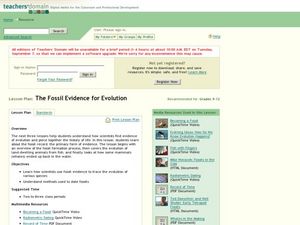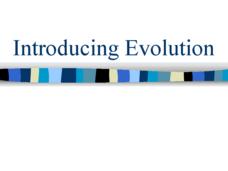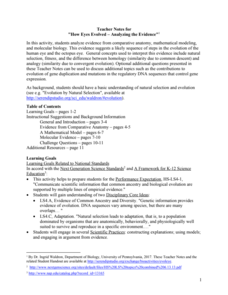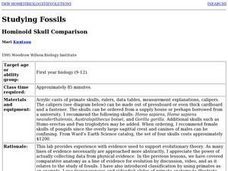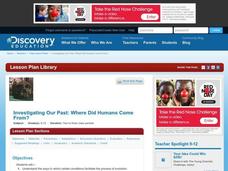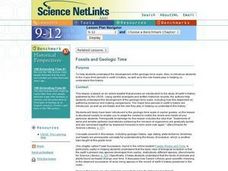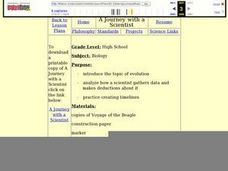Curated OER
The Fossil Evidence for Evolution
Students examine how scientists use fossil evidence to trace evolution of various species and methods used to date fossils.
Curated OER
The Evidence for Evolution
Summarize a unit on evolutionary evidence. Learners recount information about the fossil record, molecular record, homologous structures, convergent evolution. This instructional activity provides plenty of room for learners to write out...
California Academy of Science
Human Evolution
As the great and hilarious Tim Minchin once said, "Science is simply the word we use to describe a method of organizing our curiosity." Science is more than just a guess; it is based on questions, observations, and evidence. High...
Curated OER
Evidence of Evolution by Natural Selection
Walk your junior biologists through the evidence that supports evolution. The fossil record, anatomical record, and molecular record are explained and supported by colorful graphs and pictures. Extensive notes are provided for some of...
Virginia Department of Education
Evidence of Evolution
What an impression fossils make! In this activity, aspiring paleontologists view fossils and construct a timeline to further understand how the lack of natural adaptation caused historical organisms to become extinct. While they should...
Curated OER
Evidence for Evolution
In this evidence of evolution worksheet, students review notes given by referring to the Nelson Biology text, chapter 11/13. Students read the notes and the specified pages in the text.
Curated OER
Evolution worksheet
Looking at evolution in detail, this thorough worksheet has complex questions requiring details and explanations of natural selection and diversity. Various examples of biological characteristics are available, and students choose the...
Curated OER
The Fossil Evidence for Evolution
Learners explore how scientists use fossils to explore how various species have evolved over time. In this fossil lesson students study how to date fossils.
Curated OER
Natural Selection and Evidence Worksheet
Matching and fill-in-the-blank exercises give biology whizzes a chance to practice vocabulary associated with evolution. Terms to be reviewed focus on evidence for evolution, natural selection concepts, and some genetics words. You could...
Curated OER
What is the Evidence for Evolution?
Learners identify one object that would tell the story of their lives. In groups, they determine what can and cannot be told from objects left behind. After watching a video, they compare and contrast chicken bones to human bones. To...
Curated OER
Introducing Evolution
The intent of this slide show is to introduce young biologists to evolution, specifically how populations change through time. The content does not support the stated objective. What you will find in this presentation is general...
Serendip
How Eyes Evolved – Analyzing the Evidence
Octopodes existed for hundreds of thousands of years before humans, yet our eyes share many similarities. Scholars analyze the evidence to determine if the evolution of eyes best fits a homology or analogy model. They discuss the issue...
Virginia Department of Education
Adaptation and Evolution
Um may be the atomic symbol for confusion, but it won't be needed in this lesson. Scholars rotate through seven stations completing experiments, hands-on activities, writing exercises, and analysis. Stations include material on...
Curated OER
Human Evolution
Students investigate hominid evolution to learn the difference between a relative and an ancestor. They study the emergence of bipedalism and the related physical adaptations and cultural ramifications, and chart patterns of hominid...
Curated OER
Studying Fossils: Hominoid Skull Comparison
Students collect data on the differences in Hominid skulls using acrylic casts of fossil skulls. They measure a series of structures on skulls from six different species then use the data to determine evolutionary relationships between...
Curated OER
The Earliest Humans
Study the wonder and science that leads us to our human past. From Darwin and Huxley's assertions regarding the origin of the species to the discoveries at Oldivi Gorge, this PowerPoint is sure to interest your class. They'll learn about...
Curated OER
Classroom Cladogram of Vertebrate/Human Evolution
Learners build a Colossal Classroom Cladogram of vertebrate evolution. After putting it together, they show the gradual, mosaic accumulation of the traits which we, as humans, possess.
Curated OER
Investigating Our Past: Where Did Humans Come From?
Investigate the theories of human evolution. In this research based lesson, learners research and discuss how geographic isolation, interbreeding, generalization, and specialization are factors in the history of humans. Groups work...
Curated OER
Roots: The Ancestry of Modern People
High schoolers investigate the models for the origin of modern humans and the conditions that facilitate speciation and evolution. The classification and nomenclature of hominid species is also examined.
Curated OER
How do we know that the theory of evolution is correct?
Students read passages and view a slide show on the theory of evolution and provide evidence that this theory is correct. In this evolution lesson plan, students read about fossils, anatomy, organs, fetal development, and more.
Curated OER
Science NetLinks: Fossils and Geologic Time
Students investigate the development of the geologic time scale. Also, to introduce them to the major time periods in earth's history, as well as to the role fossils play in helping us understand this history.
Curated OER
Fossils and Geologic Time
Students explore the development of the geologic time scale. They examine the major time periods in earth's history. Students discuss the role fossils play in helping us understand history.
Curated OER
Finding the Ages of Rocks and Fossils
Young scholars practice dating fossils. They learn the concept of "deep time"--that earth was formed billions of years ago. They experience excellent hand-outs and virtual age tutorial links.
Curated OER
A Journey with a Scientist
Students work in groups as they read chapters of Charles Darwin's, Voyage of the Beagle. They take notes on the chapter and in their group make a timeline of the chapter. They tape the timelines together in order to depict the entire...


